#Marco Polo Bridge Incident
Photo
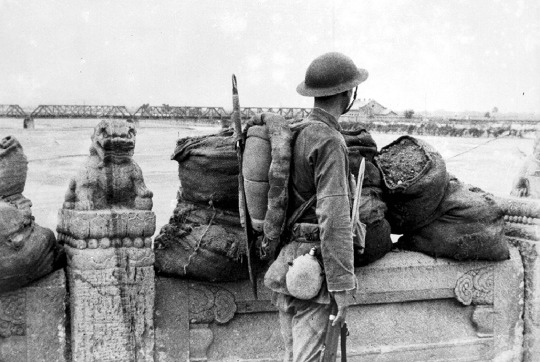
Sentinelle chinoise sur le pont Marco Polo – Incident du pont Marco Polo (Lugou Bridge Incident) – Wanping – Chine – Juillet 1937
©Republic of China – Ministry of the National Defense
Les troupes de l'armée japonaise du Guandong s'entraînaient le 7 juillet 1937 près de Wanping, à l'extrémité du pont Marco Polo (Pont de Lugou) situé à 16 km à l'ouest de Pékin. Des coups de feu éclatèrent vers 23 h et un soldat japonais manquait à l'appel. Les Japonais demandèrent la permission de fouiller les maisons de Wanping afin de le retrouver, opération qui leur fut refusée par la Chine. Les Japonais saisirent le casus belli pour faire venir des renforts et encercler la ville. Ce fut le point de départ de la seconde guerre sino-japonaise (Source Wiki).
#WWII#Guerre Sino-japonaise#Second Sino-Japanese War#Incident du pont Marco Polo#Marco Polo Bridge Incident#Lugou Bridge Incident#Armée chinoise#Armée Nationale Révolutionnaire#ANR#Pont Marco Polo#Marco Polo bridge#Pont Lugou#Lugou bridge#Wanping#Chine#China#07/1937#1937
12 notes
·
View notes
Text
1937-Marco Polo Bridge Incident
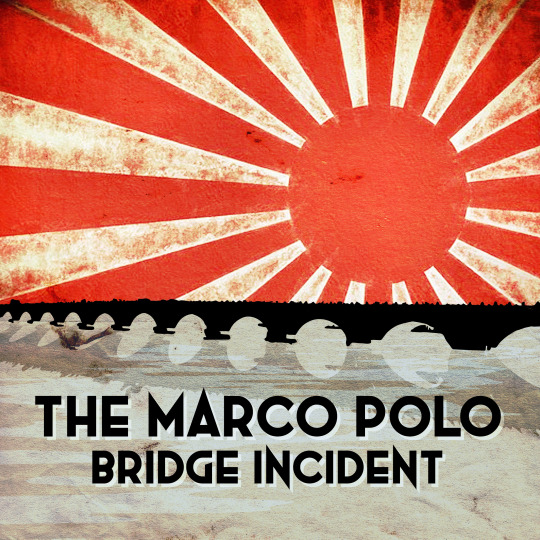
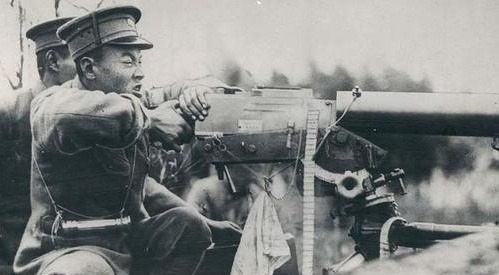
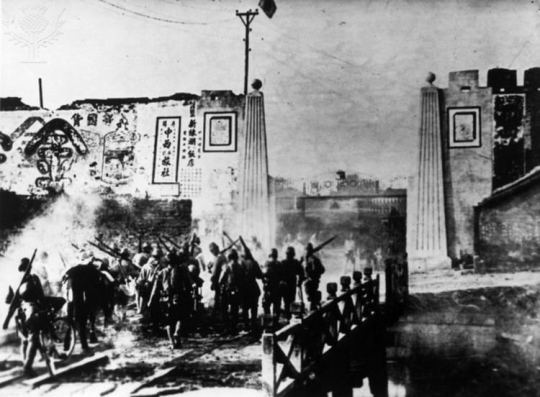
The Marco Polo Bridge Incident (Lugou Bridge) provides the Imperial Japanese Army with a pretext for starting the Second Sino-Japanese War (China-Japan War).
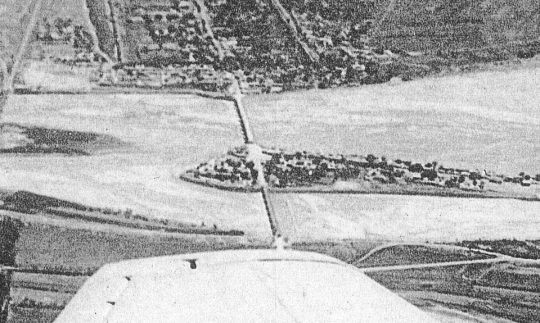
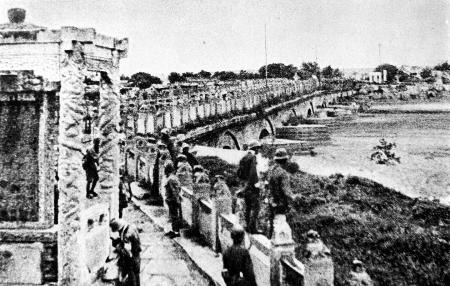
The Marco Polo Bridge Incident, also known as the Lugou Bridge Incident (traditional Chinese: 盧溝橋事變; simplified Chinese: 卢沟桥事变; pinyin: Lúgōuqiáo Shìbiàn) or the July 7 Incident (simplified Chinese: 七七事变; traditional Chinese: 七七事變; pinyin: Qīqī Shìbiàn), was a battle during July 1937 in the district of Beijing between China's National Revolutionary Army and the Imperial Japanese Army.
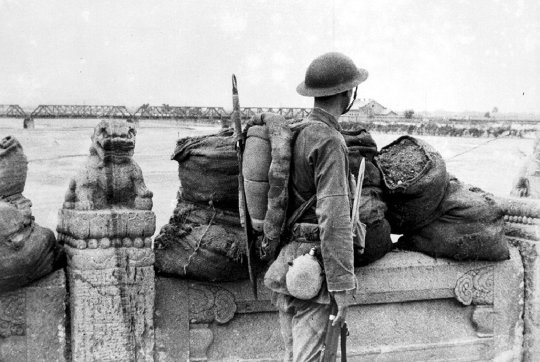
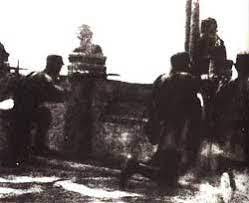
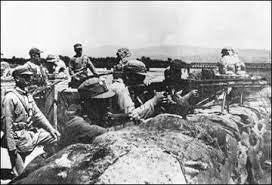
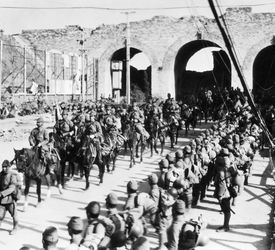
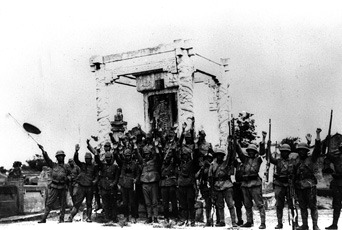
Since the Japanese invasion of Manchuria in 1931, there had been many small incidents along the rail line connecting Beijing with the port of Tianjin, but all had subsided. On this occasion, a Japanese soldier was temporarily absent from his unit opposite Wanping, and the Japanese commander demanded the right to search the town for him. When this was refused, units on both sides were alerted and the Chinese Army fired on the Japanese Army, though the missing Japanese soldier had already returned to his lines. The Marco Polo Bridge Incident is generally regarded as the start of the Second Sino-Japanese War, and arguably World War II.
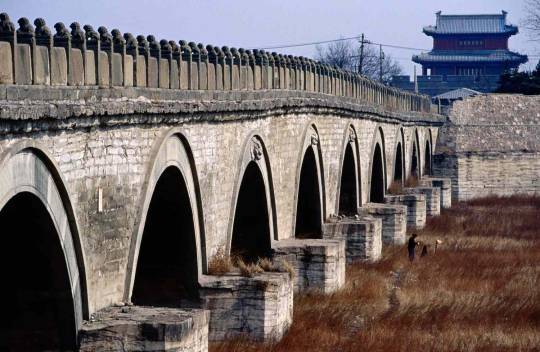
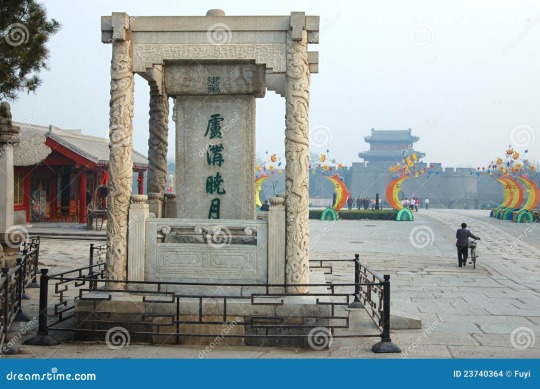
1 note
·
View note
Text
GJ and ZZH Updates — July 02-08
<<< previous week || all posts || following week >>>
This is part of a weekly series collecting updates from and relating to Gong Jun and Zhang Zhehan.
This post is not wholly comprehensive and is intended as an overview, links provided lead to further details. Dates are in accordance with China Standard Time, the organization is chronological. My own biases on some things are reflected here. Anything I include that is not concretely known is indicated as such, and you’re welcome to do your own research and draw your own conclusions as you see fit. Please let me know if you have any questions, comments, concerns, or additions. :)
[Glossary of names and terms]
[Masterlist of my posts about the situation with Zhang Zhehan]
07-02
→ A TikTok account called Ocean Zhang posted an extremely cringey video of Zhang Sanjian dancing with one of the ugly dolls they’re obviously having trouble selling. The account was found to have been made on 06-15 at an IP address located in Taiwan. The IP of the video was California. [source] Given how TikTok’s algorithm works, it’s best to completely avoid it.
→ Gong Jun made it to Jay Chou’s concert in Haikou and even got to sing with him! Videos: [1] [2] [Translation of their conversation] #Gong Jun Jay Chou chorus Hair Like Snow# got on Weibo entertainment hotsearch and #GongJun trended on Twitter.
Fan Observations:
- He was wearing the Wooyoungmi shirt again.
- Hair Like Snow was mentioned by Zhang Zhehan as one of his favourite Jay Chou songs, which he had sung himself at a school talent show. The album that it’s on, November’s Chopin, released on 2005-11-01.
→ Gong Jun posted a video of himself at the concert. Caption: “I’m! so! ha! ppy!”
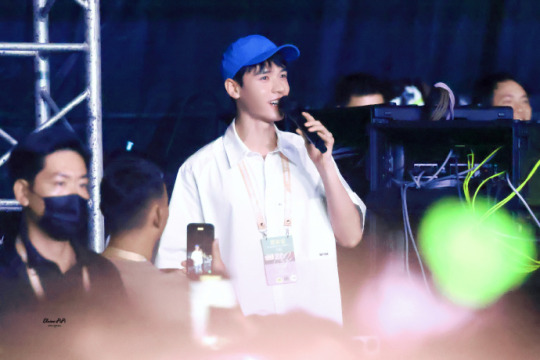
(photo from the fansite Elaine&Pipi)
07-03
→ The Legend of AnLe Weibo account posted a video of behind the scenes footage. Caption: “The boat of love makes waves at first sight?! Ren AnLe @Dear Dilireba made a bold move to Han Ye @ Gong Jun Simon, as if he heard someone's heart beating in disorder!” Shortly after, they also posted eight promotional stills of the main cast.
→ Gong Jun’s studio posted three promotional stills of Gong Jun in Legend of AnLe. Caption: “Qingming is like a sweet spring, Ye Ran is like a god, hope to meet with his highness @ Gong Jun Simon soon.”
07-04
→ #TheLegendofAnle trended on Twitter.
→ Fresh posted a commercial featuring Gong Jun. (1129 kadian)
07-05
→ The Instagram posted song lyrics.
→ Fresh posted a photo ad featuring Gong Jun. (1129 kadian)
→ Gong Jun’s studio posted a vlog of him at the Jay Chou concert. Caption: “There is also a chorus without mic, and the enthusiastic audience @ Gong Jun Simon has a full record of the concert!”
→ Gong Jun’s studio posted a douyin of him singing at the concert. Caption: “@ Gong Jun Simon is confident! (We also have a solo cam!)” (17:05 timestamp and 1:29 long video, if you want to make a 51129 kadian out of that)
07-06
→ The Instagram posted pictures of Polaroids.
→ #ZhangZhehan trended on Twitter.
→ The teashop was fined 129k RMB for excessive packaging in violation of environmental protection laws, violation of food safety laws, engaging in food production they do not have a license for, and failure to correctly label food quantity on packaging, with Chen Bingjun (Chen Liying’s daughter) fined 11k RMB personally.
07-07
→ Gong Jun reposted a post from Xinhua News in remembrance of the Marco Polo Bridge Incident. Added caption: “Don’t forget the national insult, remember the history, and use the deeds of heroes and martyrs to inspire our generation to act bravely!” His studio did the same, added caption: “Follow the right path and strive for self-improvement. Always remember the spirit of the martyrs, and may peace remain forever!”
→ A photographer, Xie Huailiang, made a Xiao Hong Shu post reminiscing about a photoshoot he did with Gong Jun in 2016, saying that Gong Jun hasn’t been changed by the industry and is still very caring and hardworking. His post mentioned Word of Honor as the point Gong Jun rose to fame.
Fan Observation: The photographer also previously did a shoot with Zhang Zhehan, and did not delete his post of this after 813.
07-08
→ Another Zhang Sanjian TikTok video with content similar to the previous one.
Additional Reading:
→ Hidden Strike, the Jackie Chan and John Cena action-comedy that Gong Jun played a small role* in in 2018, is now showing in theatres in the US. It will be releasing on American Netflix on 07-28.
*He is reportedly only in about the first 20 minutes.
→ Offline promotions for Legend of AnLe have begun. It seems it really is finally coming soon. 🤞
→ Subs are finally being made for Go Fighting! season 9! At the time of this post the first 3 episodes are subbed. [playlist]
<<< previous week || all posts || following week >>>
17 notes
·
View notes
Text
The sword of the day is the dadao.
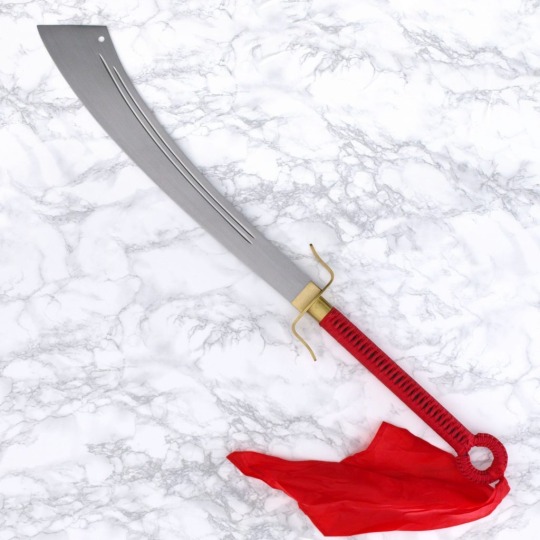
This is a Chinese weapon, and a variant of the dao, or saber. As such, it is a single-edged weapon primarily used for slashing, and this variant in particular features a very broad blade and significant size that allows it to be a formidable chopping sword. It was a peasant’s weapon, and also a relatively recent development; it saw notable use at the Marco Polo Bridge Incident of 1937, an altercation between Chinese and Japanese forces that could be argued as the start of World War II. The loose fabric tassel is a feature common on Chinese weapons, and serves a mainly decorative function. Some sources I found claim that it also functioned as a distraction to opponents in combat, but personally I have doubts about its effectiveness in that capacity.
8 notes
·
View notes
Text
learning about the marco polo bridge incident w higurashi
3 notes
·
View notes
Photo

Battle of Shanghai, 1937
Claiming an incident at the Marco Polo Bridge, southwest of Beijing, Japan attacked China on July 7, 1937. This was the start of the Second Sino-Japanese War, the objective of which was to create in China a zone under the influence Japanese. August 13 begins the Battle of Shanghai.
by @LegendesCarto
63 notes
·
View notes
Text
ridiculous to me that snow white and the seven dwarfs (1937), the marco polo bridge incident, and zora neale hurston’s their eyes were watching god are all from the exact same year
19 notes
·
View notes
Text
Meta on "propaganda reblogs". This post is Section 3.
1) Introduction: why I am, for once, waving my candy-washing soap
2) Anatomy of a propaganda reblog, Part 1: the midnight timestamp
3) Anatomy of a propaganda reblog, Part 2: the ultrashort response
4) Beyond the propaganda: the significance (and tragedy) of events remembered by these posts
5) Conclusion: The Li Jiaqi Paradox
(Below the cut — Section 3: The Ultrashort Response)
Now, let's take a look at the responses included in the reblogs. Candy washing can be a little unpleasant to read, I understand. I promise it'll be over soon.
The responses are often very short. In today's (2022/08/01) case, there were no added words, just a tag. It's this particular characteristic, perhaps, that has given a false impression to some that these reblogs of propaganda are unimportant — make them appear as if they're just something everyone does, like some (boring) homework everyone just scribbles down a word or two and submits. Gets them over with.
It's ... more complicated than that.
A closer look at the responses, and one will probably notice this: their wording is often a paraphrase of the original propaganda post, with little added information or sentiments. In certain cases, it's a character-by-character duplicate of words in the original post...
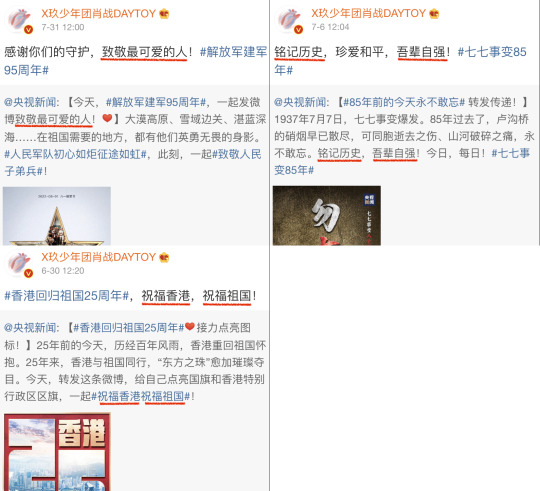
Gg's reblogs tend to follow the original post's wording more than Dd. I've underlined, in red, the duplicated wording. In the first post (upper left), which was about the Making of the Communist Chinese Army, the duplicated phrase, 致敬最可愛的人, meant "paying respect to the most loveable people". In the second post (upper right) about the Marco Polo Bridge Incident that started the Second Sino-Japanese War, the duplicated phrases 銘記歷史,吾輩自強 meant "Remember history, our generation shall strengthen themselves". In the third post (lower left) about the Hong Kong Handover, the duplicated phrase simply meant Bless Hong Kong, Bless the Ancestral Country (= China).
Wait, you may say. But doesn't the duplicated wording serve as further evidence that these responses, these reblogs are like ... boring homework?
Hmm. Perhaps, let me offer a counter-example first. What if a star decides to inject more of themselves, of their understanding of the subject, into their response to a propaganda campaign?
This happened just before the 25th anniversary of Hong Kong Handover, a month ago.
The star caught in controversy was Jacky Cheung 張學友, a beloved, and highly respected singer from Hong Kong (he's 60). Asked by CCTV to make a short video about the handover, he agreed and, in his native Cantonese dialect, said the following:
youtube
大家好,我係張學友
香港過去25年經歷過好多高高低低起起跌跌
但係因為我係同依個城市一齊成長
我係依度出生,係依度長大
我仍然相信呢個城市
仍然都希望呢個城市會變成一個比以前更加好既城市
香港加油
Hello, I'm Jacky Cheung.
In the last 25 years, Hong Kong has gone through many highs and lows, ups and downs.
But because I'm growing with this city,
(because) I was born here, I was raised here,
I still believe in this city,
Still wish it'll become a city better than before.
Go Hong Kong.
Sounds okay, right? More detailed, more personal than a post reblog. CCTV thought so too, apparently; it approved the video and aired it.
But then, Cheung was attacked — not by his antis (which he didn't have many with his age and status), but by the nationalistic trolls, the "Little Pinks" — and the attack was ferocious enough that CCTV soon had to remove the video.
Cheung's crime, according to these trolls: not so much because he acknowledged Hong Kong had gone through lows and downs; not, even, so much because he said "Go Hong Kong" — an innocuous phrase (as innocuous as its English translation) that the 2019 protestors had just happened to have used.
Cheung's biggest crime was he failed to mention, in the video, 祖國, literally ancestral country and means motherland, or China, and 回歸 return.
Cheung, who lives in Hong Kong and doesn't own a Weibo, failed to grasp the One Message behind China's propaganda surrounding the Handover anniversary. It wasn't about Hong Kong's well-being. It wasn't about Hong Kong's future, or anyone's love for the city. It was about Ownership. It was about the People's Republic of China now possessing Hong Kong.
Why had the opinions of the nationalistic trolls managed to override that of CCTV's? The answer: the dominance of these trolls on Chinese social media has been a signature of the Xi era. With China's heavy-handed censorship in place, voices as loud, as violent as theirs can only remain online if the state offers its implicit approval.
These trolls have served, in their own way, as hounds and spies for the government. They threaten, do the dirty work the state would otherwise have to perform itself. They intimidate fellow netizens to silence in places where censorship isn't quick enough to reach. They report dissenters who have gained influence to the platforms, to the police.
In the end, Cheung was "saved" by the powerful political influencer Hu Xijin 胡 錫進, the former editor of the State Tabloid The Global Times. He defended Cheung's patriotism. Chinese netizens protested, asked why Hu came so quickly to an old Hong Kong artist's defence, while younger, mainland Chinese artists hadn't been given the same understanding, the same accommodation?
Seniority was the likely answer. Traditionally, Hong Kong artists have, also, been given more room to express themselves, with the culture of their home city recognized. But the netizens' observation was not incorrect. A young mainland Chinese artist would've gotten temporarily suspended, at least, for saying the exact same things, starting with the lows and downs.
The Chinese government has always been harsher to those who are closer to it.
In all cases, I hope the Jacky Cheung incident proves sufficient to make this point: public figures in China can say more thoughtful things, more heartfelt things, more sincere things about a political issue than the content on these propaganda posts, and end up being tarred and feathered for them.
As such, the short to the point of curt, the redundantly-worded responses to propaganda posts aren't products of laziness, or lack of care.
On the contrary, they're products of (extreme) caution.
They make sure the message delivered by the star aligns perfectly with the government's. Reblogging the propaganda posts, rather than making one's own posts about the same topic, doubles this safety factor:
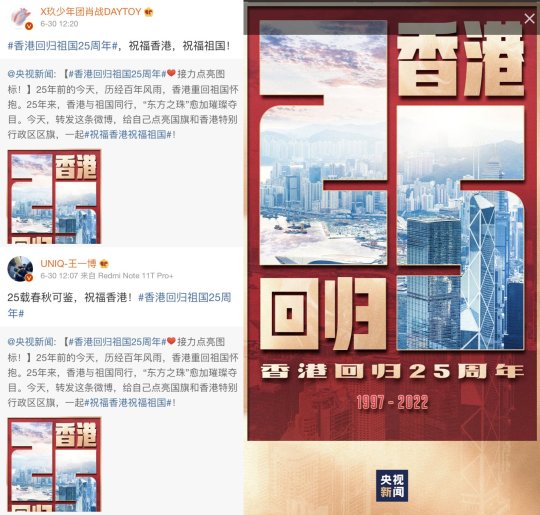
The "safety factor" in reblogging state media propaganda posts. In their responses, Gg (top left) wrote 祝福香港,祝福祖國 Bless Hong Kong, Bless the Ancestral Country (= China), Dd (bottom left) wrote 25載春秋可監,祝福香港 25 years of Springs and Autumns for witnesses, Bless Hong Kong. While, like Jacky Cheung, Dd didn't explicitly mention 祖國 Ancestral Country (= China), and while both Gg and Dd didn't mention 回歸 Return, the phrase was already included in the tag #香港回歸祖國25週年 #25th Anniversary of Hong Kong's Return to the Ancestral Country. The graphic (right) further ensured the rebloggers would be viewed as having their messages in perfect alignment with the government's — its Communist Red background was a reinforcing visual that Hong Kong's ownership has been transferred to China.
The caution applied to crafting the responses means that, as is true for the close-to-midnight timestamps, there's ... little sweetness in similarly-worded responses to propaganda posts. Because they're they're statements made in rigid adherence to the state's ideology. Because there's little of the rebloggers injected into them.
Of note: those who read Weibo closely may notice that even the fans follow these subtle propaganda post reblog rules. They reblog the reblogs of their favourite stars quickly, and respond, too, in short, similarly-worded statements. While, with their anonymity, these fans are more likely to treat these posts as boring homework, they're also doing it to protect their favourite stars. As illustrated in Section 1), given that celebrities congregate in these posts, the latter present convenient locations for haters to stalk and sniff for signs of disloyalty, for messages not adhering to the propaganda's theme; for fan-reblog counts failing to match the star's perceived "traffic". The motivation of these haters is simple: in the Xi era, insufficient patriotism is cause enough to rage a cyberbullying storm.
Some of you may have noticed that up till now, in the figures and descriptions, I've left out the most recent propaganda post (2022/08/01) about One China.
The reason is: that post was a slight departure from the standard propaganda reblog, and I'd like to address it separately. Its different-from-usual nature is, I believe, also reflected in the stars' responses.
Unlike the anniversaries which the propaganda posts are mostly about, which the state has already made a clear stance and rhetoric surrounding the mentioned event, this latest post was about a piece of breaking news, an ongoing development with strong elements of unpredictability — not so much on the Taiwan / U.S. side, but on China's side: now that Nancy Pelosi has stepped on Taiwanese soil, will President Xi start a war?
This means the response to this post became more than a contest of speed, of who could reblog faster. It also became a test of who was politically savvy, who could better walk the tight-rope of expressing a firm belief — a commitment to the One China stance — while not letting on anything extra.
Because no one knew what would happen next. Because Pelosi's visit presented President Xi with a dilemma that even the most experienced political analysts could not predict his next actions.
Revanchism plays a big part in how the Xi regime fans China's nationalistic sentiments. This is a new word I learned, so I'd write down its definition here to remember it better: revanchism means the "political manifestation of the will to reverse territorial losses incurred by a country", drawing "its strength from patriotic and retributionist thought and is often motivated by economic or geopolitical factors", and relying "on the identification of a nation with a nation state, often mobilizing deep-rooted sentiments of ethnic nationalism". (Source)
Revanchism for China involves, of course, taking back the "lost territory" of Taiwan. It should be a piece of cake, right? Taiwan is tiny, and at the center of the propaganda campaign promoting President Xi's 新時代思想 New Age thoughts are nationalistic slogans like 實現中華民族偉大復興的中國夢 Realizing the Chinese dream of the Great Revival of the Chinese Race, and 東升西降 East rises, West falls.
These slogans, taken altogether, have broadcast to the Chinese people that China, both as a country and a race, has emerged to become the world's superpower, and will soon kick the declining, failing Western democracies off the international stage.
Before Pelosi's visit, China's People's Liberation Army, its Foreign Ministry, its state media have all promised retaliation, with gritted teeth and all, should the visit take place. And after the years of "patriotic education", many Chinese were believed them, were convinced that an armed conflict would happen as soon as Pelosi set foot on Taiwan, that their country would finally flex its mighty military muscles and 武統 — forcibly re-unify — Taiwan, the rogue child who, they say, their loving mother(land) has indulged for far too long. Moreover, these people were convinced that the re-unification would be very speedy, given how mighty China they believe has become.
Attack in the morning, says the most faithful among them, and by 6 pm, Taiwanese will be watching the CCTV's national news broadcast with mainland Chinese.
In reality, experts have doubted that Taiwan can be taken so easily. While China has a much larger military, islands like Taiwan are notoriously difficult to invade — even a TV show from China shot with sponsorship from the People's Liberation Army acknowledged the difficulty of seizing control of an island, hypothetical the island might have been (Ace Troops 王牌部隊, Episodes 35-39). The Taiwan military is expected to get help from the United States, likely in the areas of surveillance and weaponry, especially after the summer of 2022. The Russian invasion of Ukraine has illustrated, too, how unwise it can be to underestimate the will of those whose homeland freedoms are threatened, and who, in Taiwan's case, have nowhere to escape to, being surrounded by the ocean.

(Source — a decent, short summary from BBC about China vs Taiwan.)
Some have also questioned whether China can really afford to start a war, given the rapid loss of confidence by its people towards the country's economy at the moment. While economic downturns and recessions have been ubiquitous around the world, such turn of events may present more problems for China, with the conventional wisdom that a good (prosperous) life is often the implicit social contract between an autocracy and its people — ie. people would only consider the loss of their freedoms worthwhile only if they're given a dependable livelihood. And President Xi can hardly deny his responsibility for the rising doubts: the foundation of China's economy has been reportedly shaky for a while now, and Xi's Zero-COVID policy, his heavy-handed crackdown of the country's most lucrative industries since 2020, have all been pushing, shoving the big, bubbly thing stacked precariously upon it.

The famous Outer Beach 外灘, or the Bund, of Shanghai, deserted during its 4-days-turned-into-2-months lockdown in Spring, 2022 (Source). China's battle against COVID is now widely perceived as having transformed from a public health issue to a political movement, a power struggle — with President Xi's faction insisting on upholding the Zero-Covid policy as an ideology, a showcase of China-Can-Do-Better-Than-the-West; meanwhile, dissenters are concerned about the effects of continued lockdowns and aggressive testing on the already fragile economy. In April, 2022, not a single car was sold in Shanghai, a city of 25 million.
But, how can President Xi save his face should he decide to not wage a war? What about his Chinese Dream then, his Great Revival of the Chinese Race, his rhetoric about avenging every insult China has suffered? What about the declining West? The West hasn't declined nearly enough, apparently, if China proves itself to be too chicken to confront just one of them and over its own tiny island. What will be Xi's basis, his claim for wanting a third term in the office this autumn, which had been against China's Constitution until he removed its presidential term limits in 2018? 10 years in the office, and he has precious little achievement to show for them.
Starting a war is the surest way for Xi to raise his support.
Starting a war is also the surest way for Xi to expose his weaknesses.
Hence, the unreadability of President Xi, the difficulty in guessing his next actions. WWPXD? (What Would President Xi do?)
A propaganda post was published, as expected, on CCTV's blog soon after Pelosi's touchdown in Taiwan, at the earlier-than-midnight time of 22:19, exclaiming that There's Only One China in the World.
Ideally, those must respond to the post could take their time, wait for more events to unfold to respond. See what Pelosi would say to the Taiwanese Congress the next day, for example, or to President Tsai. But antis and melon-eaters and trolls were watching. This presented a challenge — what was the best response one could offer?
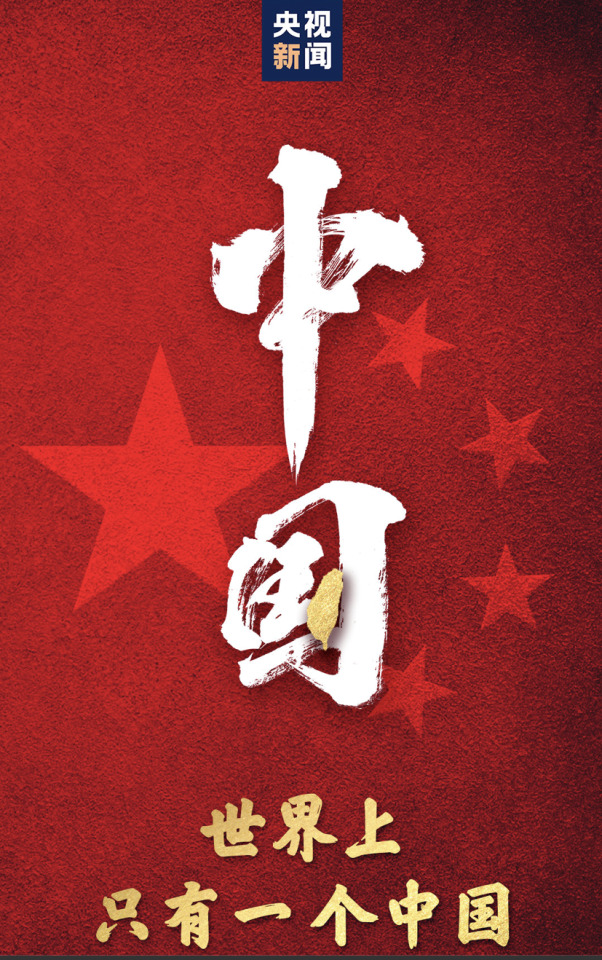
Graphic in the propaganda post by CCTV, 2022/08/01. The caption in gold says 世界上只有一個中國, There's Only One China in the World.
If the response expressed a wish for peace — the Chinese Foreign Ministry had accused the United States as being the provocateur, that China only wanted peace and stability in the region — what if President Xi decided to attack Taiwan over the next days? If they responded, instead, with Taiwan being the disobedient child deserving a hard lesson, what if their leader decided to hold off a military assault?
It is impossible for anyone but those involved to know the thought processes of the stars and their teams' had while drafting the reblogs. I can only screenshot the outcome and post here — the responses of four of China's favourite stars:
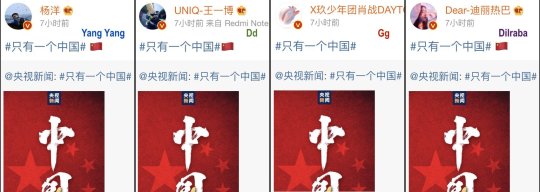
A tag only, with the exact wording as the tag from CCTV. #只有一個中國 #Only One China.
Loud, but silent.
Smart.
Safe.
United.
A political landmine averted, for now.
** Gently puts down the candy-washing soap **
=====
The "Propaganda Reblog" Meta Series:
1) Introduction
2) The midnight timestamp
3) The ultrashort response < YOU'RE HERE
4) Beyond the propaganda
5) Conclusion: The Li Jiaqi Paradox
32 notes
·
View notes
Text
I was curious about what people were saying about Abe on 微博, and a quick comments browse was quite funny
Pretty much everyone I saw was just making fun of Abe's security guards

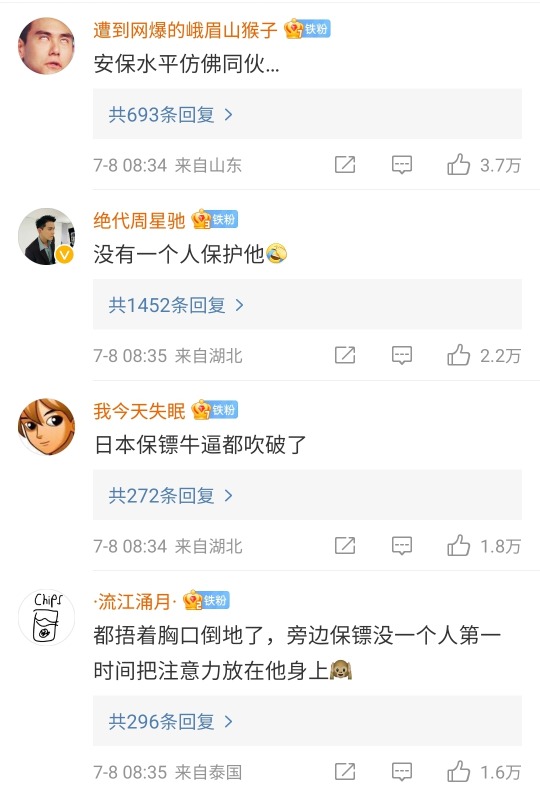
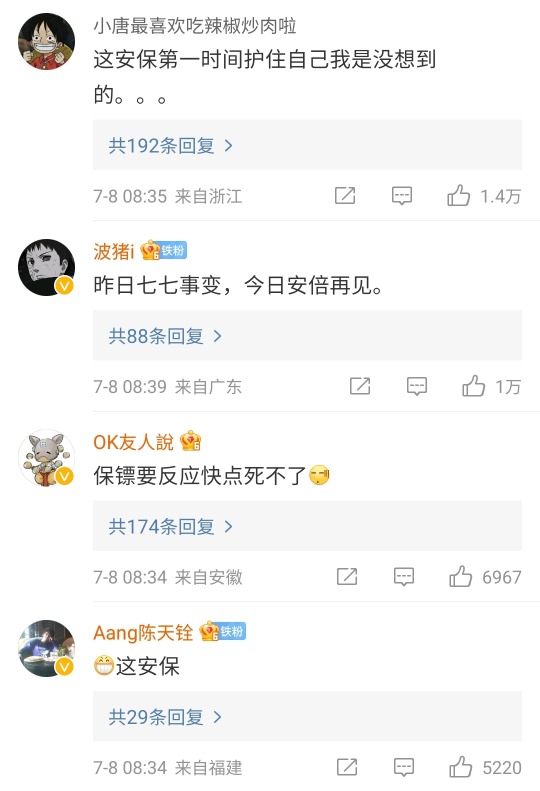
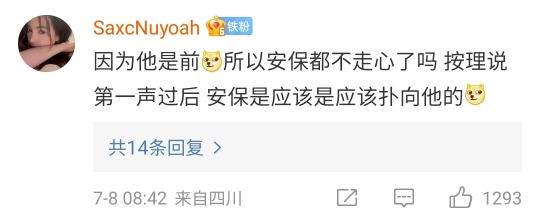
Note: 七七事变 is talking about the Marco Polo bridge incident. The 85th anniversary of the event was this July 7, aka the day before Abe died
2 notes
·
View notes
Text
youtube
EXECUTION of Gunkichi Tanaka - Japanese Soldier who BEHEADED 300 People during the Nanjing MASSACRE
Execution of Gunkichi Tanaka Japanese Soldier who Beheaded 300 People during the Nanjing Massacre. 18 September 1931. Japan, seeking raw materials to fuel its growing industries, invades Manchuria - an industrial area located in Northeastern China known for its rich mineral and coal reserves. In the following years, there will be various "incidents", or armed clashes of a limited nature between the Empire of the Rising Sun and the Republic of China but full-scale war will not break out between the two countries until the Marco Polo Bridge Incident on 7 July 1937. This marks the beginning of the Second Sino-Japanese War that will end only with Japan's surrender on 2 September 1945. During this war, which is the prelude to the Pacific side of World War II, the Japanese army scores major victories, capturing Beijing and Shanghai and in December of 1937, the Japanese military invades Nanjing, then China’s capital. In Nanjing, the Japanese soldiers commit unspeakable atrocities and engage in a campaign of mass killing which over the course of two months will claim the lives of as many as 300,000 civilians and numerous unarmed Chinese soldiers. One of the men responsible for these atrocities is a Japanese Army captain Gunkichi Tanaka.
0 notes
Text
Events 7.7 (After 1900)
1907 – Florenz Ziegfeld Jr. staged his first Follies on the roof of the New York Theater in New York City.
1911 – The United States, UK, Japan, and Russia sign the North Pacific Fur Seal Convention of 1911 banning open-water seal hunting, the first international treaty to address wildlife preservation issues.
1915 – The First Battle of the Isonzo comes to an end.
1915 – Colombo Town Guard officer Henry Pedris is executed in British Ceylon for allegedly inciting persecution of Muslims.
1916 – The New Zealand Labour Party was founded in Wellington.
1928 – Sliced bread is sold for the first time (on the inventor's 48th birthday) by the Chillicothe Baking Company of Chillicothe, Missouri.
1930 – Industrialist Henry J. Kaiser begins construction of Boulder Dam (now known as Hoover Dam).
1937 – The Marco Polo Bridge Incident (Lugou Bridge) provides the Imperial Japanese Army with a pretext for starting the Second Sino-Japanese War (China-Japan War).
1937 – The Peel Commission Report recommends the partition of Palestine, which was the first formal recommendation for partition in the history of Palestine.
1944 – World War II: Largest Banzai charge of the Pacific War at the Battle of Saipan.
1946 – Mother Francesca S. Cabrini becomes the first American to be canonized.
1946 – Howard Hughes nearly dies when his XF-11 reconnaissance aircraft prototype crashes in a Beverly Hills neighborhood.
1952 – The ocean liner SS United States passes Bishop Rock on her maiden voyage, breaking the transatlantic speed record to become the fastest passenger ship in the world.
1953 – Ernesto "Che" Guevara sets out on a trip through Bolivia, Peru, Ecuador, Panama, Costa Rica, Nicaragua, Honduras, and El Salvador.
1958 – US President Dwight D. Eisenhower signs the Alaska Statehood Act into law.
1959 – Venus occults the star Regulus. This rare event is used to determine the diameter of Venus and the structure of the Venusian atmosphere.
1962 – Alitalia Flight 771 crashes in Junnar, Maharashtra, India, killing 94 people.
1963 – Buddhist crisis: Police commanded by Ngô Đình Nhu, brother and chief political adviser of South Vietnam President Ngo Dinh Diem, attacked a group of American journalists who were covering a protest.
1978 – The Solomon Islands becomes independent from the United Kingdom.
1980 – Institution of sharia law in Iran.
1980 – During the Lebanese Civil War, 83 Tiger militants are killed during what will be known as the Safra massacre.
1981 – US President Ronald Reagan nominates Sandra Day O'Connor to become the first female member of the Supreme Court of the United States.
1983 – Cold War: Samantha Smith, a US schoolgirl, flies to the Soviet Union at the invitation of Secretary General Yuri Andropov.
1985 – Boris Becker becomes the youngest male player ever to win Wimbledon at age 17.
1991 – Yugoslav Wars: The Brioni Agreement ends the ten-day independence war in Slovenia against the rest of the Socialist Federal Republic of Yugoslavia.
1992 – The New York Court of Appeals rules that women have the same right as men to go topless in public.
2003 – NASA Opportunity rover, MER-B or Mars Exploration Rover–B, was launched into space aboard a Delta II rocket.
2005 – A series of four explosions occurs on London's transport system, killing 56 people, including four suicide bombers, and injuring over 700 others.
2007 – The first Live Earth benefit concert was held in 11 locations around the world.
2013 – A De Havilland Otter air taxi crashes in Soldotna, Alaska, killing ten people.
2016 – Ex-US Army soldier Micah Xavier Johnson shoots fourteen policemen during an anti-police protest in downtown Dallas, Texas, killing five of them. He is subsequently killed by a robot-delivered bomb.
2019 – The United States women's national soccer team defeated the Netherlands 2–0 at the 2019 FIFA Women's World Cup Final in Lyon, France.
2022 – Boris Johnson announces his resignation as leader of the Conservative Party following days of pressure from the Members of Parliament (MPs) during the July 2022 United Kingdom government crisis.
1 note
·
View note
Text
Japan and China have a long and complex history of conflicts and wars dating back to ancient times. In this essay, we will explore some of the most significant wars between Japan and China throughout history.
One of the earliest conflicts between Japan and China was the Battle of Baekgang in 663 AD. This battle took place during the Korean Three Kingdoms period, and Japan supported the Baekje kingdom against the Chinese Tang dynasty. The Japanese forces were eventually defeated, and the battle marked the beginning of the Tang dynasty's dominance in East Asia.
In the 13th century, the Mongol Empire attempted to invade Japan twice, and China played a significant role in these wars. The first invasion in 1274 was repelled by a typhoon, which the Japanese called the "divine wind" or kamikaze. The second invasion in 1281 was also thwarted by a typhoon, and this event became known as the "kamikaze of Kublai Khan." Although China was not directly involved in these invasions, they provided military support and supplies to the Mongol Empire.
In the late 19th century, Japan and China went to war over Korea, which was then a tributary state of China. Japan had been modernizing and expanding its influence in Asia, and they saw Korea as a strategic location to expand their empire. The First Sino-Japanese War began in 1894, and Japan quickly gained the upper hand due to their superior military technology and tactics. China was forced to sign the Treaty of Shimonoseki, which ceded Taiwan, the Pescadores Islands, and the Liaodong Peninsula to Japan. The war marked the beginning of Japan's emergence as a major imperial power in Asia, while China's decline as a major world power continued.
In 1937, Japan and China went to war again over Chinese territory. The Second Sino-Japanese War began with the Marco Polo Bridge Incident, where a dispute between Japanese and Chinese soldiers led to a full-scale invasion of China by Japan. The war was brutal and lasted for eight years, with an estimated 14 million Chinese civilians and soldiers dying during the conflict. Japan committed numerous war crimes, including the infamous Rape of Nanking, where Japanese soldiers massacred and raped hundreds of thousands of Chinese civilians. The war finally ended in 1945 with Japan's surrender to the Allied Powers.
In modern times, Japan and China continue to have a complicated relationship, with tensions often arising over territorial disputes and historical grievances. The two countries have engaged in numerous diplomatic and economic exchanges, but the legacy of their past conflicts continues to affect their relationship today.
In conclusion, Japan and China have a long and complex history of conflicts and wars, from ancient times to the present day. These conflicts have shaped the political and cultural landscape of East Asia and have left a lasting impact on both countries. While they have engaged in diplomatic and economic exchanges in recent years, the legacy of their past conflicts continues to affect their relationship today.

0 notes
Text
Week 20 Blog
The Rape of Nanking by Iris Chang
Pages read:81-130 pages
Word Count : 425
Summary(155):When more solider join fight the more there where turned into prisoners and they were promised to get food and work.Many of japanese soldiers who raped women and those women who give birth there child was secretly was taken away from them and was killed.The a person named john rabe a german Nazi party member who was there to lead the nanking safety zone and help the civilan.He turned office and other place a shelter for people to live and give them food.Many japanese solider backed off cause his status as nazi cause them to think before commiting it.After a incident at Marco polo bridge people in naking started to carry around gas mask fearing of japanese poision gas attack.Later the fall of nanking The big trench that chinese has build for tank traps were filled to top with by japanese with the bodies of dead and wounded soliders.
Critical Analysis(141):The Author included this in the book “Dark times paralyze most people, but some very few, for reasons most of us will never understand, are able to set aside all caution and do things even they could not imagine themselves doing in ordinary times.” because to show the audience that when you are in hard/taught time you may forget what to do and have no idea how to do .But in other situation some other people are kinda the opposite they will do stuff that you can't even imagine to get out of that situation.They are only doing this stuff because they in dark time but if there were not in that situation they probably never think about that.So it just depend what situation you are in and for that reason people brain work different in that times.
Personal Response(129):During this chapter of reading its kinda boring cause it kinda going into more detail of what it said on other chapter and kinda repeating whats happening.So for that reason wasn't a good chapter to read but near the end it was opening new information about some different country and how they are starting to get involve in this story/book.So I think or Hope so they tell more information about how more country got involved and what's the benefits get are getting for doing so.Other than that wasn't much to talk about except one person who is a great/famous person who is helping out in the story and the people are naming their kids on him because that's how much he impacted on people.
0 notes
Text
Meta on "propaganda reblogs". This post is Section 4.
1) Introduction: why I am, for once, waving my candy-washing soap
2) Anatomy of a propaganda reblog, Part 1: the midnight timestamp
3) Anatomy of a propaganda reblog, Part 2: the ultrashort response
4) Beyond the propaganda: the significance (and tragedy) of events remembered by these posts
5) Conclusion: The Li Jiaqi Paradox
(Below the cut — Section 4: Beyond the Propaganda)
Lastly, there's another reason to refrain from playing with these propaganda posts that has nothing to do with the Chinese government or its propaganda machine.
As I mentioned above, these posts are often about anniversaries of national importance. While some of the events celebrated / commemorated are Chinese-Communist-Party-specific, many of them are about major wars and natural disasters. Propaganda posts on July 7th, August 15th and December 13th, for example, all commemorate events from the Second Sino-Japanese War and World War II (1937-1945), marking the anniversary of the Marco Polo Bridge Incident that started the wars, Imperial Japan's surrender that ended the wars, and the Nanking Massacre respectively.
Has the Chinese government been using these wars to stir up fanatic nationalism by fanning the flames of anti-Japan sentiments? Yes.
Nonetheless, regardless of the Chinese government's stance on them, the Second Sino-Japanese War and World War II have been named the Asian Holocaust, or Forgotten Holocaust for the atrocities committed towards Chinese. It doesn't matter how the Chinese state propaganda portrays these events; it remains true that 14 million Chinese civilians perished in these wars (6 million Jews died during World War II). It remains true that, not only Chinese, but Koreans, Taiwanese, Philipinos ... were brutally tortured and murdered during those wars.

World War II casualties, by country. China was the second highest in total numbers, highest in the civilian-only death count. The flag presenting China in the graphic is Taiwan's National Flag, as Kuomintang 國民黨, aka the Nationalist Party, was still governing China during the war.
(I previously wrote a meta series about these wars, and the Chinese state response to these wars.)
Propaganda posts have also covered natural disasters, and major accidents such as plane crashes. The 2008 Wenchuan 汶川earthquake commemorated in the posts in Section 2), for example, was responsible for the deaths of 69,000 people.
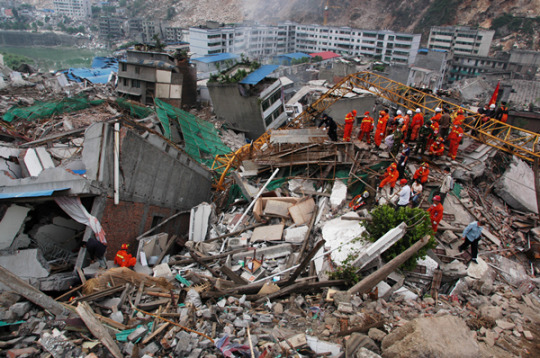
Aftermath of the 2008 Wenchuan Earthquake, with its magnitude of 8.0 that lasted 2 minutes (Source).
I'll leave everyone to their own conclusion whether these propaganda posts, then, are suitable playing material. I'll also let everyone decide for themselves whether they'd like to have their loved ones, their favourite stars and even themselves included, be described as someone who'd send secret messages, about romance, in particular, over these posts.
You may say, Pie, but you're just picking the worst examples. Not all of these posts are that serious. Like today's There's Only One China in the World. It's just a slogan at the end of the day, isn't it? It's not like Taiwan and China have started fighting yet. Even if they do fight, maybe it won't be bad. This is the era of modern warfare, after all ...
Yes.
I agree. Really. There are many reasons to be optimistic. However, I shall present the following, the worst-case scenario people in the region know about.
In early 2019, President Xi proposed to Taiwan that it could have its own version of One Country, Two Systems — similar to the governing structure in Hong Kong since 1997, the same structure that President Xi himself would, in less than two years, smash into smithereens and cement the victory of Tsai Ing-Wen 蔡英文, the candidate of the historically independence-leaning Democratic Progressive Party 民進黨, in the 2020 Taiwan presidential election.
While Taiwan distanced itself from China as it watched the events in Hong Kong unfold, a slogan appeared and spread on Chinese social media. It was chanted by, again, the nationalistic trolls — the cyber hounds who had had implicit state permission to roam and shout on the Chinese internet:
留島不留人
Keep the island, don't keep the people.
This slogan can still be heard, sometimes, on Weibo. I have only been able to access Weibo sporadically since Pelosi's visit, and so I don't know whether it has turned louder. What I do know is, the slogan has never truly gone away.
What does it mean?
... Bearing in mind that the propaganda on Hong Kong's Handover was about possession. Ownership.
... Bearing in mind that the Chinese state has, for years, describe One China with the phrase 國土完整 -- completeness of the country's soil (emphasis on soil).
... Bearing in mind that Chairman Mao, who President Xi has tried so hard to emulate, once (in)famously declared: "I’m not afraid of nuclear war ... China has a population of 600 million; even if half of them are killed, there are still 300 million people left.”
... Bearing in mind that President Xi's face, his — I wouldn't be surprised at all if that's how he sees it too — his macho-ness as a leader, are now at stake ...
I'll leave to you, my readers, to interpret what 不留人 don't keep the people on Taiwan may eventually mean.

Hopefully, this will lighten the mood. Taiwan President Tsai Ing-Wen with her family of animals. Her two cats are Tsai Think-Think and Tsai Ah-Tsai, and her three dogs — all retired service animals — are Bella, Bunny and Maru. President Tsai is unmarried and has no children. (Source)
=====
The "Propaganda Reblog" Meta Series:
1) Introduction
2) The midnight timestamp
3) The ultrashort response
4) Beyond the propaganda < YOU'RE HERE
5) Conclusion: The Li Jiaqi Paradox
23 notes
·
View notes
Text
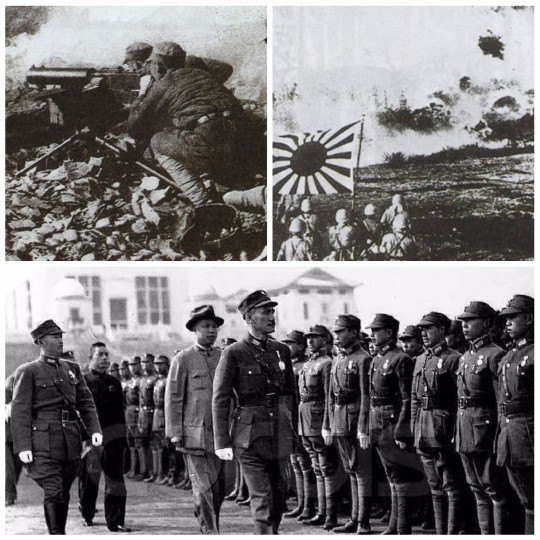
• Battle of Wuhan
The Battle of Wuhan, popularly known to the Chinese as the Defense of Wuhan, and to the Japanese as the Capture of Wuhan, was a large-scale battle of the Second Sino-Japanese War.
On July 7th, 1937, the Imperial Japanese Army (IJA) launched a full-scale invasion of China following the Marco Polo Bridge Incident. Both Beijing and Tianjin fell to the Japanese by July 30th, exposing the rest of the North China Plain. After the fall of Shanghai, Nanjing, which was the capital of China, was threatened directly by the Japanese forces. The nationalists were thus forced to declare the capital as an open city while beginning the process of moving the capital. With the fall of three major Chinese cities (Beijing, Tianjin, and Shanghai), there was a large number of refugees fleeing the fighting in addition to the government facilities and war supplies that needed to be transferred to the city of Chongqing. On the Japanese side, the IJA forces were drained due to the large number and extent of military operations since the beginning of the invasion. Reinforcements were thus dispatched to boost forces in the area, but this placed a considerable strain on the Japanese peacetime economy. Although putting Japan's economy on a wartime footing slowed down the depletion of its treasury, the economic situation was not sustainable long-term, given the cost of maintaining a military that could deal with the Soviet Union in a border conflict. The Japanese government thus wished to force the Chinese into submission quickly in order to gather resources to move on with their decision over northward and southward expansion. For the Japanese commanders, it was decided that Chinese resistance should be put to an end at Wuhan.
Wuhan, located halfway upstream of the Yangtze River, was the second largest city in China with a population of 1.5 million in late 1938. The Yangtze River and the Hanshui River divides the city into three regions, which include Wuchang, Hankou and Hanyang. Wuchang was the political center, Hankou was the commercial district and Hanyang was the industrial area. After the completion of the Yuehan Railway, the importance of Wuhan as a major transportation hub in the interior of China was further established. It also served as an important transit point for foreign aid moving inland. After the Japanese capture of Nanjing, the bulk of Nationalist government agencies and military command headquarters were located in Wuhan despite the fact that the capital had been moved to Chongqing. Wuhan thus became the de facto wartime capital at the onset of the engagements in Wuhan. The Chinese war effort was thus focused on protecting Wuhan from being occupied by the Japanese.
In December 1937, the Military Affairs Commission was created to determine the battle plan for the defense of Wuhan. After the loss of Xuzhou, approximately 1.1 million men or 120 divisions of the National Revolutionary Army were redeployed. The commission decided to organize the defense around the Dabie Mountains, Poyang Lake, and the Yangtze River against the 200,000 Japanese, or 20 divisions of the Imperial Japanese Army. After the Japanese occupied Xuzhou in May 1938, they sought to actively expand the scale of the invasion. The IJA decided to send a vanguard to first occupy Anqing for use as a forward base for an attack on Wuhan, then for its main force to attack the area north of the Dabie Mountains moving along the Huai River, eventually occupying Wuhan by way of the Wusheng Pass. However, due to the Yellow River flood, the IJA was forced to abandon the plan of attacking along the Huai, and decided to attack along both banks of the Yangtze instead. On 4 May, the commander of the IJA forces, Shunroku Hata, organised approximately 350,000 men of the Second and Eleventh Armies for the fighting in and around Wuhan.
The Battle of Wuhan was preceded by a Japanese air strike on 18 February 1938. It was known as the "2.18 Air Battle" and ended with Chinese forces repelling the attack. On 29 April, the Japanese air force launched major air strikes on Wuhan to celebrate Emperor Hirohito's birthday. The Chinese, with prior intelligence, were well prepared. This battle was known as the "4.29 Air Battle" and was one of the most intense air battles of the Second Sino-Japanese War. In an attempt to win more time for the preparation of the defense of Wuhan, the Chinese opened up the dikes of the Yellow River in Huayuankou, Zhengzhou on June 9th. The flood, now known as the 1938 Yellow River flood, forced the Japanese to delay their attack on Wuhan. However, it also caused around 500,000 to 900,000 civilian deaths in North China. On 15 June, the Japanese made a naval landing and captured Anqing, signalling the onset of the Battle of Wuhan. On the southern bank of the Yangtze River, the Chinese Ninth War Zone had one regiment stationed west of Poyang Lake, and another regiment stationed in Jiujiang. On June 24t, the Japanese forces made a surprise landing in Madang, while the main force of the Japanese Eleventh Army attacked along southern shore of the Yangtze River. Madang quickly fell to the Japanese, which opened up the route to Jiujiang.
The Chinese defenders tried to resist the Japanese advance, but they could not repel the landing force of the Japanese 106th Division from capturing Jiujiang on the 26th. The Japanese Namita detachment moved westward along the river. In the meantime, other Japanese forces and the supporting river fleet continued their advance westwards along the Yangtze, encountering resistance from the defending Chinese 31st Army and 32nd Army Group west of Ruichang. While the Japanese Army attacked Ruichang, the 106th Division moved along the Nanxun Railway (now known as Nanchang-Jiujiang) on the south side. The defending Chinese 4th Army, 8th Army Group, and 29th Army Group relied on the advantageous terrain of Lushan and north of Nanxun Railway to resist. As a result, the Japanese offensive suffered a setback.
In the north of the Dabie Mountains, the Chinese 3rd Army Group of the Fifth War Zone stationed the 19th and 51st Army Groups and the 77th Army in the Liuan and Huoshan regions in Anqing. The 71st Army was tasked with the defense of Fujin Mountain and Gushi County in Henan. The Chinese 2nd Group Army was stationed in Shangcheng, Henan and Macheng, Hubei. The Chinese 27th Army Group and the 59th Army was stationed in the Yellow River region, and the 17th Army was deployed in the Xinyang region to organise the defensive works. The Japanese attacked in late August with the 2nd Army Group marching from Hefei on two different routes. The 13th Division, on the southern route, breached the Chinese 77th Army's defensive line and captured Huoshan, then turned towards Yejiaji. The nearby Chinese 71st Army and the 2nd Army Group made use of their existing positions to resist the Japanese onslaught, halting the Japanese 13th Division. The defenders retreated southwards out of the city, using their strategic strongholds in the Dabie Mountains to continue the resistance. On October 24th, the Japanese occupied Macheng.
Due to the continuing stalemate around Wuhan and the continued influx of foreign aid to Chinese forces from ports in the south, the IJA decided to deploy 3 reserve divisions to pressure the naval shipping lines. It was thus decided to occupy the Guangdong port by way of an amphibious landing. Because of the fighting in Wuhan, the bulk of Chinese forces in Guangzhou had been transferred away. As such, the pace of the occupation was much smoother than expected and Guangzhou fell to the Japanese on October 21st. The successive victories attained by the Japanese forces completed the encirclement of Wuhan. Since the loss of the Guangzhou area meant that no more foreign aid would be flowing in, the strategic value of Wuhan was lost. The Chinese Army, hoping to save their remaining forces, thus abandoned the city on October 25th. The Japanese Army captured Wuchang and Hankou on the 26th of October and captured Hanyang on the 27th, concluding the campaign in Wuhan.
After four months of intense fighting, both the Chinese Air Force and the Navy were decimated as the IJA had successfully captured Wuhan. However, the main Chinese land force remained largely intact, while the IJA was significantly weakened. The battle of Wuhan bought more time for Chinese forces and equipment in Central China to move further inland to Chongqing, laying the foundation for an extended war of resistance. After the capture of Wuhan, the IJA advance in central China was slowed down significantly by multiple battles around Changsha in 1939, 1941, and 1942. No more major offensives were launched until Operation Ichi-Go in 1944, with limited offensives mounted for the sole purpose of training recruits. The Chinese managed to preserve their strength to continue resisting the weakened IJA, reducing its capability to respond to rising tensions between Japan and the Soviet Union at the borders in the Northeast.
#second world war#world war 2#chinese history#second sino japanese war#imperial japan#japanese history#wuhan#military history#military#wwii
135 notes
·
View notes
Note
1/2) While I think his heart is in the right place, Ryukishi's handling of those war crimes had some unfortunate implications. The story implies that the Marco Polo Bridge incident was instigated by a paranoid Hinamizawa soldier. And moreover, scenes with Irie and Takano toyed with the idea that other parasitic diseases are responsible for religions, ideologies, and subsequent wars that came about in part because of them. Aside from that being ridiculously pseudoscientific (seriously, you'd
2/2) really have to stretch in order to explain away things like conversions, sects, and people becoming atheists), it comes dangerously close to apologism. Going by Irie's logic, the Axis powers didn't commit atrocities of their own free will, but because fictitious diseases made them do it. It's just another form of avoiding responsibility.
Anon, my dude, I don't know if you're following this blog or just passing by, but I hope you realize you've put me into a difficult position here, because um. I wrote my thesis on metahistory, so this is kinnnnda right in the middle of my field of expertise, and now I'm tempted to write up a reply that's half the length of my thesis, but I'm supposed to be writing self-indulgent fic today, so ima keep my answer as short as possible. 😅 So, in short:
Yes, it's apologism, but that's pretty much the whole point and acknowledged several times in-story - if I wasn't so decidedly busy today, I'd go back for actual screenshots, but since I know you're familiar with the source material, I'll assume you simply didn't remember that this aspect of the parasitism theory is repeatedly brought to question in several scenes of Matsuribayashi-hen, starting from the prologue scene where Dr. Takano explains it himself. (In fact, it's strongly implied that the theory was incorrect to begin with, seeing as they were never able to gain any substantial proof of the parasites' existence despite their numerous attempts at dissecting both dead and live specimens. What we learned afterwards from Umineko only strengthens this doubt.)
I'm sure you know this already, but I'll reiterate for clarity's sake: taboo is one of the central themes in Higurashi, and the questions surrounding the Marco Polo Bridge incident reflect that theme perfectly. Putting aside the fictional syndrome inserted as the trigger to the incident, Ryukishi clearly implies that, at least in-universe, Japan was the first to attack, and was ready to prevent this from coming to light at the cost of over 2000 civilian lives. Even in a fictional setting, this argument is HUGE coming from Japanese popular media, and probably the reason it was cut from the anime adaptation. (As a relevant side note/kind of random book rec, 'Purity and Danger' by Mary Douglas is a classic of cultural anthropology and a mind-blowing read on the concept of taboo, def worth checking out if you find yourself interested in the subject!)
In even shorter: brain parasitism is readily discussed in-story as a post-war medical taboo, and the Marco Polo Bridge incident as a political taboo. If Ryukishi had meant to use this fictional setting as means of shirking Japanese responsibility in war crimes, he probably wouldn't have painstakingly depicted the political conspiracies and unethical countermeasures that were put into play just to prevent the knowledge of Japan's initiation at Marco Polo Bridge from coming to light.
It's an understandable misinterpretation, though! The prologue bit where Dr. Takano explains to Miyo why brain parasitism has become taboo after the war, and the way he seems to view said taboo purely as a hindrance to scientific progress, does make your hair stand up a bit for the reasons you mentioned. But those ideas were voiced just to show what kind of influence Miyo had been subjected to, and Irie does strictly refute this kind of thinking in a later scene. But you know, that's just what makes Ryukishi's characterization game so freaking strong. There's no sock puppetry going on, and some deductive work is left to the reader as well.
In any case, thank you for this wonderful ask! I was actually having trouble falling asleep last night and happened to check my phone, and contemplating this ask turned out to be just the thing my brain needed to chill and get some z’s at last. ^^
#higurashi#higurashi no naku koro ni#higurashi spoilers#(tagging just in case since there's quite a lot of new fans because of gou)#not gf
8 notes
·
View notes